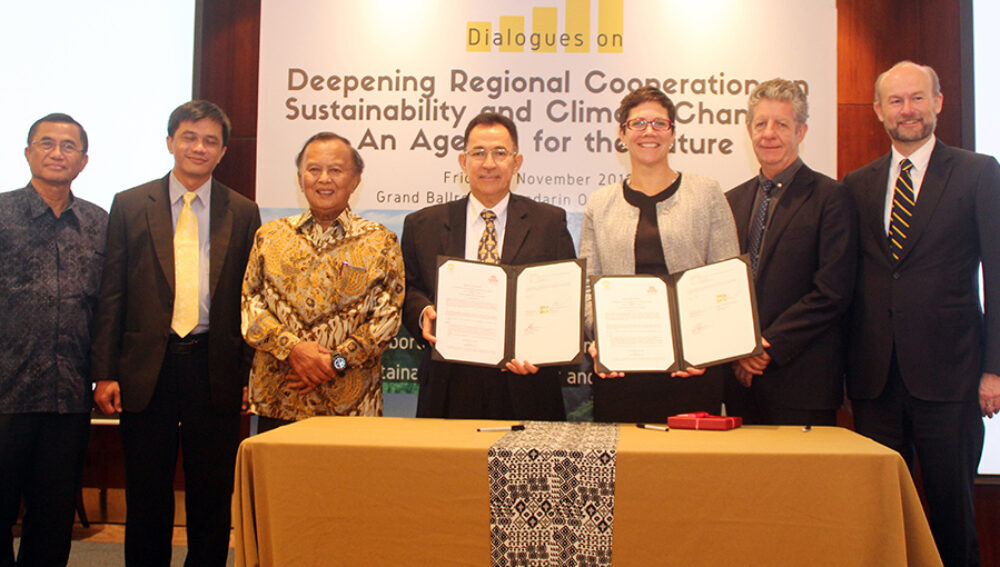Last week Griffith Asia Institute (GAI) led an academic delegation to Indonesia for the Jakarta launch of the Collaborative Australia-Indonesia Program on Sustainable Development and Climate Change (CAISDCC).
We had launched this program earlier in the year at Griffith University’s Nathan campus. But to launch again in Jakarta was particularly special. First, it was emblematic of the two-way nature of the partnership we hope to inspire and live up to through this program. To this end, GAI was privileged to work with the Honourable Rachmat Witoelar, the Indonesian President’s Special Envoy for Climate Change and his team in developing and advancing the launch agenda. Together, we engaged a range of perspectives from Australia and Indonesia—across government, academia, business and civil society — in dialogue about how we might advance our respective interests in sustainable development while taking action to mitigate and adapt to a changing climate.
Second, the Jakarta launch signified the beginning of new partnerships, and we were especially pleased to welcome the University of Indonesia (UI) and their Institute of Sustainable Earth and Resources (ISER) as Indonesian partners in this collaborative program. We look forward to working closely with UI and ISER in developing dialogues, research collaborations, student workshops and mobility experiences as the program continues to develop.
The launch itself was much more than a ceremonial event. Plenary and workshop sessions challenged participants to engage more deeply with key issues across four thematic areas: i) maritime and coastal adaptation in Eastern Indonesia; ii) future needs and response measures; iii) mitigating climate change through sustainable landscape management; and iv) climate change impacts on health.
The discussion across each of the four areas brought many commonalities to light, and highlighted the importance of sharing our knowledge and experience. Ensuring local wisdom and traditional knowledge might be integrated alongside contemporary research methods, to inform better policy and decision-making, emerged as a critical theme.
Our Griffith delegation, although few in numbers, brought interdisciplinary strengths to the discussion, representing the breadth of Griffith’s interests in sustainable development and climate change, and an impressive depth of understanding and expertise in Indonesia. We all came away with new ideas and opportunities, and a greater appreciation of the potential for collaboration with Indonesia.
Special mention must be made of the fact that the collaborative program reflects nearly ten years of engagement and collaboration in Indonesia, led in particular by Dr Peter Davey — Director of the Centre of Excellence for Sustainable Development for Indonesia, as well as Professor Cordia Chu and Professor Brendan Mackay. Further special mention should also be made of Rachmat Witoelar an adjunct professor and longstanding friend of Griffith University, for his tireless championing of climate change issues and his deep optimism for the role that Australia and Indonesia might play together to address the pressing challenges before us.
The Griffith University delegation to Jakarta included:
- Professor Colin Brown, Adjunct Professor, Griffith Asia Institute
- Professor Caitlin Byrne, Director Griffith Asia Institute
- Professor Cordia Chu, Director, Centre for Environment and Population Health
- Dr Febi Dwirahmadi, Lecturer, School of Medicine
- Dr Rob Hales, Program Director, Griffith Centre for Sustainable Enterprise
- Dr Prasad Kaparaju, Senior Lecturer School of Engineering and Build Environment
- Professor Brendan Mackay, Director, Griffith Climate Change Response Program
- Mr Samuel Mackay, Program Manager, Griffith Climate Response Program
- Professor Haig Patapan, Director, Centre for Governance and Public Policy
- Mr Gunaro Setiawan, Research Assistant, Collaborative Program for Sustainable Development and Climate Change (based in GAI)
- Dr Tapan Sarker, Senior Lecturer, Department of International Business and Asia Studies.




























